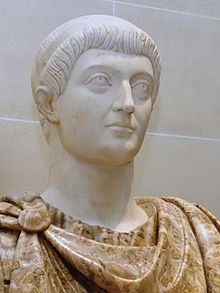Constans I
| Constans | |||||
|---|---|---|---|---|---|
| 62nd Emperor of the Roman Empire | |||||

Bust of Constans
|
|||||
| Reign | 337–350, jointly with Constantine II (until 340) and Constantius II | ||||
| Predecessor | Constantine I | ||||
| Successor | Constantius II | ||||
| Born | c. 323 | ||||
| Died | February 350 Vicus Helena, southwestern Gaul |
||||
|
|||||
| Dynasty | Constantinian | ||||
| Father | Constantine I | ||||
| Mother | Fausta | ||||
| Full name | |
|---|---|
| Flavius Iulius Constans Augustus |
Constans (Latin: Flavius Iulius Constans Augustus; c. 323 – 350) or Constans I was Roman Emperor from 337 to 350. He defeated his brother Constantine II in 340, but anger in the army over his personal life and preference for his barbarian bodyguards led the general Magnentius to rebel, resulting in the assassination of Constans in 350.
Constans was the third and youngest son of Constantine the Great and Fausta, his father's second wife. He was educated at the court of his father at Constantinople under the tutelage of the poet Aemilius Magnus Arborius.
On 25 December 333, Constantine I elevated Constans to the rank of Caesar at Constantinople. Constans became engaged to Olympias, the daughter of the Praetorian Prefect Ablabius, but the marriage never came to pass. With Constantine’s death in 337, Constans and his two brothers, Constantine II and Constantius II, divided the Roman world between themselves and disposed of virtually all relatives who could possibly have a claim to the throne. The army proclaimed them Augusti on September 9, 337. Almost immediately, Constans was required to deal with a Sarmatian invasion in late 337, over whom he won a resounding victory.
Constans was initially under the guardianship of Constantine II. The original settlement assigned Constans the praetorian prefectures of Italy and Africa. Constans was unhappy with this division, so the brothers met at Viminacium in 338 to revise the boundaries. Constans managed to extract the prefecture of Illyricum and the diocese of Thrace, provinces that were originally to be ruled by his cousin Dalmatius, as per Constantine I’s proposed division after his death. Constantine II soon complained that he had not received the amount of territory that was his due as the eldest son.
...
Wikipedia
